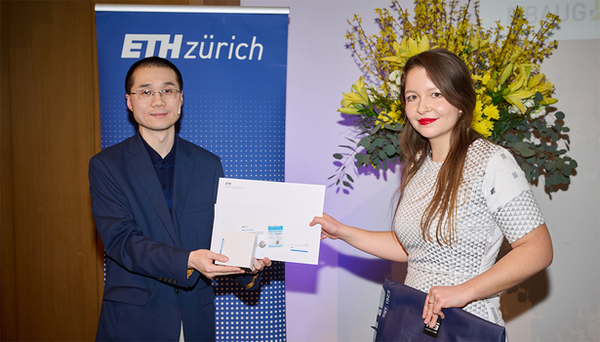Department Process Engineering
An ETH medal for Lena Xue
May 14, 2024 |
Since 2021, a modern five-stage Faecal sludge treatment plant has been in operation in Kumasi, Ghana, treating the faecal sludge of this city of millions. Lena had originally travelled there to take measurements as part of her Master's thesis at ETH and to check the plant's functionality. However, she soon realised that regular measurements were not always possible as the treatment performance of the plant was often unstable. So she quickly changed the focus of her master's thesis and investigated the challenges of operating a plant like the one in Kumasi.
Lots of high-tech but expensive to maintain
"Companies from Europe often build such high-tech plants, but they are not adapted to the conditions at the site and are designed for wastewater instead of faecal sludge," explains Lena. This not only leads to high operating, maintenance and repair costs, but also to unstable operation and problems such as foaming.
Socio-economic factors are also decisive for the performance and operation of the plant. For example, spare parts and chemicals have to be ordered abroad, and inflation can quickly cause prices to double. Supply chains are also not always guaranteed and chemicals are missing or only available to a limited extent. For future construction projects, Lena therefore recommends designing faecal sludge treatment plants suitable for local conditions. An expensive plant is only useful if it can be used for several years.
A lot of initiative and a few hurdles
The fact that she was able to complete her Master's thesis on this topic is largely thanks to her own initiative. She defined the topic herself, organised additional funding and at the same time took care of numerous administrative hurdles: from visas and importing laboratory materials to coordinating the research stay.
The main supervisor of her work was ETH Professor Elizabeth Tilley, with the support of Eberhard Morgenroth as co-supervisor. "I also benefited from the practical and laboratory experience I gained during my Master's project at Eawag with Kai Udert and Vuna, among others," says Lena. Her efforts have now been recognised with the award of the ETH Medal. In addition, she has also been honoured with the Culmann Prize - both together are endowed with prize money of CHF 4000.
Her Master's thesis has now led to Lena recently taking up her position as a doctoral student at Eawag. In her doctoral thesis, she wants to find out how decentralised wastewater treatment with the aim of water reuse can be safely implemented in places with limited resources.

